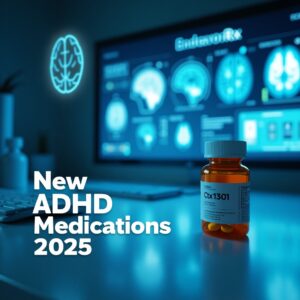New ADHD Medications 2025: What You Need to Know💊
The ADHD treatment landscape is evolving rapidly, with groundbreaking advancements offering hope to millions. New ADHD Medications 2025 are set to reshape treatment, with the FDA’s latest moves making waves. Here’s a breakdown of the newest options, their pros and cons, and expert insights to help you navigate these developments.

1. CTx-1301: A Novel Once-Daily Stimulant in New ADHD Medications 2025
What’s New?
Cingulate Inc.’s CTx-1301 (dexmethylphenidate) is poised to revolutionize ADHD treatment. This once-daily medication uses Precision Timed Release (PTR) technology to deliver three timed doses of dexmethylphenidate, a proven stimulant, ensuring sustained symptom control for up to 16 hours.
Pros:
- Extended Efficacy: Clinical trials showed significant improvement in ADHD symptoms, with effect sizes up to 1.79 on the PERMP scale (a math-based performance test) compared to placebo.
- Lower Side Effects: Only 9% of participants reported adverse events (vs. 30% on placebo), including minimal appetite suppression or cardiovascular issues.
- Patient Satisfaction: Over 60% of trial participants preferred CTx-1301 to their prior medications due to its long-lasting effects and convenience.
Cons:
- Stimulant Classification: As a Schedule II drug, it carries a risk of misuse, though its PTR design may reduce this potential.
- Availability: Expected to launch in late 2025 post-NDA approval, pending further regulatory review.
Expert Opinion:
2. Qelbree: New ADHD Medications 2025 Option for Lactating Parents
What’s Updated?
In January 2025, the FDA updated Qelbree’s label to include lactation data, confirming minimal transfer to breast milk. This non-stimulant, approved for children and adults, inhibits norepinephrine reuptake and modulates serotonin receptors.
Pros:
- Breastfeeding-Friendly: Safe for lactating parents, addressing a critical gap in ADHD care.
- Non-Stimulant Option: Ideal for patients avoiding stimulants due to misuse concerns or side effects.
Cons:
- Moderate Efficacy: Effect sizes are smaller than stimulants, and it may take weeks to show full benefits.
Expert Opinion:
3. EndeavorRx: A Game-Changer in Digital ADHD Treatment
Not a Pill, But a New ADHD Medications 2025 Innovation
This prescription video game, designed for children aged 8–12, improves attention through adaptive cognitive training. Studies show 73% of users experienced measurable symptom reduction after 4 weeks.
Pros:
- Zero Side Effects: A drug-free option ideal for families wary of medications.
- Engaging Format: Turns therapy into play, boosting adherence.
Cons:
- Limited Age Range: Not yet approved for adults or younger children.
4. Centanafadine: A Promising New ADHD Medications 2025 Alternative
Phase 3 Success
This triple reuptake inhibitor (targeting dopamine, norepinephrine, and serotonin) showed significant symptom reduction in adults, regardless of prior treatment history. Trials highlight its potential as a first-line non-stimulant.
Pros:
- Broad Efficacy: Works for both stimulant-naïve patients and those with prior treatment failures.
- Low Abuse Risk: No stimulant classification, reducing diversion concerns.
Cons:
- Pending Approval: Still under FDA review, with availability expected in 2026.
Expert Takeaways on New ADHD Medications 2025
Personalized Care:
“The future of ADHD treatment lies in matching patients to therapies based on their unique needs—whether stimulants, non-stimulants, or digital tools,” says Dr. Corina Weir.
Holistic Approaches:
Combining medication with behavioral therapy or lifestyle changes (e.g., diet, mindfulness) yields the best outcomes.
Conclusion
With the introduction of New ADHD Medications 2025, patients have more tailored options than ever. Whether you’re considering a novel stimulant like CTx-1301, a non-stimulant such as Qelbree, or a digital therapeutic like EndeavorRx, the future of ADHD treatment is promising.
Note: Always consult a healthcare provider before starting or changing treatments.
